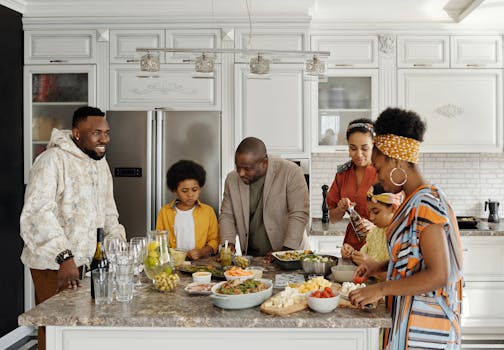Best Practices for Tackling Complex Issues in Relationships: Enhance Communication with Interpersonal Skills and Conflict Resolution Strategies
Learning new things helps us grow and feel happier. But what is lifelong learning? It is the practice of picking up new skills or hobbies every day. Why is it important? Because it boosts our well-being and keeps our minds active. This guide shares effective communication techniques for tackling complex issues in relationships, focusing on improving communication and resolving conflicts. By engaging in continuous learning, you can enhance your personal development and create stronger connections with others.
Understanding the Dynamics of Complex Relationship Issues
Complex issues in relationships often arise from misunderstandings, unmet expectations, or differing values. Recognizing these triggers is the first step in building healthy relationships. For example, a lack of communication can lead to assumptions, making problems seem larger than they are.
To identify complex issues, pay attention to recurring patterns. Do you often argue about the same topics? This might indicate deeper concerns that need addressing. Healthy boundaries in friendships play a vital role here. It helps you recognize your feelings and those of others, allowing you to navigate sensitive subjects more effectively.
Understanding your emotions can help you articulate them better. When you notice a conflict, ask yourself, “What am I feeling right now, and why?” This self-reflection can guide your responses and enhance your interactions. Building interpersonal skills for effective communication in relationships means being aware of both your emotions and the emotions of your partner. This awareness fosters empathy and understanding, essential ingredients for resolving complex issues.

Interpersonal Skills for Effective Communication in Relationships
Mastering communication is crucial to strengthen bonds in relationships. It involves more than just talking; it requires listening actively and responding thoughtfully. Active listening means giving your full attention to the speaker. Show interest by nodding or using verbal affirmations like “I see” or “Go on.” This practice encourages open and honest dialogue.
Empathy is another vital interpersonal skill. When someone shares their feelings, try to see things from their perspective. A simple acknowledgment of their feelings can make a significant difference. For instance, if a friend expresses frustration about work, instead of jumping in with your own experiences, say, “That sounds really tough; I can see why you’re upset.” This approach validates their feelings and fosters a deeper connection.
Assertiveness is equally important. It means expressing your thoughts and needs clearly without being aggressive. Use “I” statements to communicate how you feel. For example, instead of saying, “You never listen to me,” say, “I feel unheard when you interrupt me.” This subtle shift helps avoid defensiveness and opens the door for constructive conversations.
By incorporating positive habits to enhance relationships and communication, you create an environment where both parties feel safe sharing their thoughts. Remember, effective communication is like a muscle—it gets stronger the more you use it!
Conflict Resolution Strategies to Navigate Challenges
Conflict can be uncomfortable, but it also presents opportunities for growth. Turning conflict into constructive dialogue is key. Start by acknowledging the issue at hand. Instead of avoiding it, approach it directly but calmly. This practice builds trust and shows your willingness to work together.
Mediation is a powerful conflict resolution strategy. In mediation, a neutral third party helps facilitate the conversation. This can be especially helpful when emotions run high. The mediator ensures that both sides have a chance to speak and be heard.
Negotiation is another effective method. It involves compromising to find a solution that works for everyone. When negotiating, focus on interests rather than positions. For example, if two colleagues disagree on a project approach, instead of insisting on their way, they can discuss their goals. This shift can lead to creative solutions that satisfy both parties.
Collaborative problem-solving is about teamwork. It encourages both people to brainstorm solutions together. Ask questions like, “What can we do to solve this?” or “How can we make sure this doesn’t happen again?” By working together, you not only resolve the current issue but also strengthen your relationship for the future.
Interpersonal skills for career growth are essential for maintaining healthy connections. Practice them regularly, and they will become second nature.

Building Positive and Healthy Relationships
Cultivating trust and respect is crucial for lasting connections. Trust is built over time through consistent actions. When you say you’ll do something, follow through. This builds reliability, which is the foundation of trust. Respect is equally important. It means valuing each other’s opinions and feelings. Even if you disagree, acknowledge that the other person has a right to their perspective. For instance, if your partner prefers to spend weekends relaxing while you want to go out, find a compromise. Perhaps alternate between a quiet weekend and a fun outing. This way, both needs are met.
To nurture trust and respect, develop positive habits. Regular check-ins can help. Set aside time each week to discuss feelings and concerns. This can prevent misunderstandings from snowballing into larger issues.
Additionally, practice gratitude. Expressing appreciation for your partner’s efforts fosters a positive environment. A simple “thank you” can go a long way in reinforcing the bond. Exploring the benefits of positive communication can further enhance your relationship dynamics.
Building positive relationships takes effort, but the rewards—such as enhanced happiness and well-being—are worth it.
Actionable Tips/Examples: Real-Life Applications for Lifelong Learners
Here are some practical tips for applying these relationship skills in everyday scenarios:
Practice Active Listening: In your next conversation, focus entirely on the speaker. Put away distractions and make eye contact. Repeat back what you heard to confirm understanding.
Use “I” Statements: When discussing feelings, practice using “I” statements. For example, “I feel anxious when plans change last minute.” This approach helps express your feelings without blaming others.
Schedule Regular Check-ins: Set a weekly time to talk with your partner or family about any concerns or feelings. This practice keeps communication open and prevents issues from building up.
Role-Play Conflict Situations: If you have a challenging conversation coming up, practice it with a friend. This role-playing can help you articulate your thoughts better and prepare for potential reactions.
Micro-Learning Activities: Consider watching short videos or reading articles on communication skills. Websites like Coursera and LinkedIn Learning offer courses on interpersonal skills and conflict resolution.
An example of successful conflict resolution can be seen in a workplace scenario. A manager noticed team members were often at odds over project responsibilities. Instead of letting the tension grow, they held a meeting to discuss the issues openly. By using mediation techniques, they facilitated a conversation where everyone could express their concerns. As a result, the team found a new approach to dividing tasks, which improved collaboration and overall morale.

By applying these tips and strategies, you can enhance your communication and conflict resolution skills, leading to more positive relationships in your life. Remember, the journey of personal development is ongoing, and each step you take brings you closer to mastering these essential communication skills.
FAQs
Q: How can I effectively use interpersonal skills to navigate and resolve conflicts in my relationship without escalating the situation?
A: To effectively navigate and resolve conflicts in your relationship, focus on maintaining a calm and respectful tone, actively listen to the other person’s perspective, and express your feelings without placing blame. Approach the situation with empathy, seek to understand the underlying issues, and work collaboratively towards a mutually acceptable solution to prevent escalation.
Q: What are some specific conflict resolution strategies I can implement to foster a healthier communication dynamic with my partner?
A: To foster a healthier communication dynamic with your partner, implement active listening by fully focusing on what they say without interrupting, and reflect back what you’ve understood. Additionally, use “I” statements to express your feelings without placing blame, and establish regular check-ins to discuss any issues or concerns in a constructive manner.
Q: How do I build positive habits that enhance communication and strengthen our relationship over time, especially during challenging periods?
A: To build positive habits that enhance communication and strengthen your relationship, focus on regular, open conversations where both partners express their feelings and needs without judgment. Utilize techniques such as active listening, showing appreciation, and addressing conflicts with positive intent, which can help maintain connection and understanding during challenging times.
Q: In what ways can I leverage life skills to build and maintain a strong, healthy relationship, particularly when complex issues arise?
A: To build and maintain a strong, healthy relationship amidst complex issues, leverage life skills such as effective communication, active listening, and emotional intelligence to navigate challenges collaboratively. Reflect on past experiences to identify patterns and lessons learned, ensuring that both partners feel heard and supported while working together to find solutions.
